HVAC Companies Honley
Find the best HVAC Services in Honley
Get multiple Heating and Cooling Services quotes for your project today! Compare profiles, reviews, accreditations, portfolio, etc... and choose the best deal.
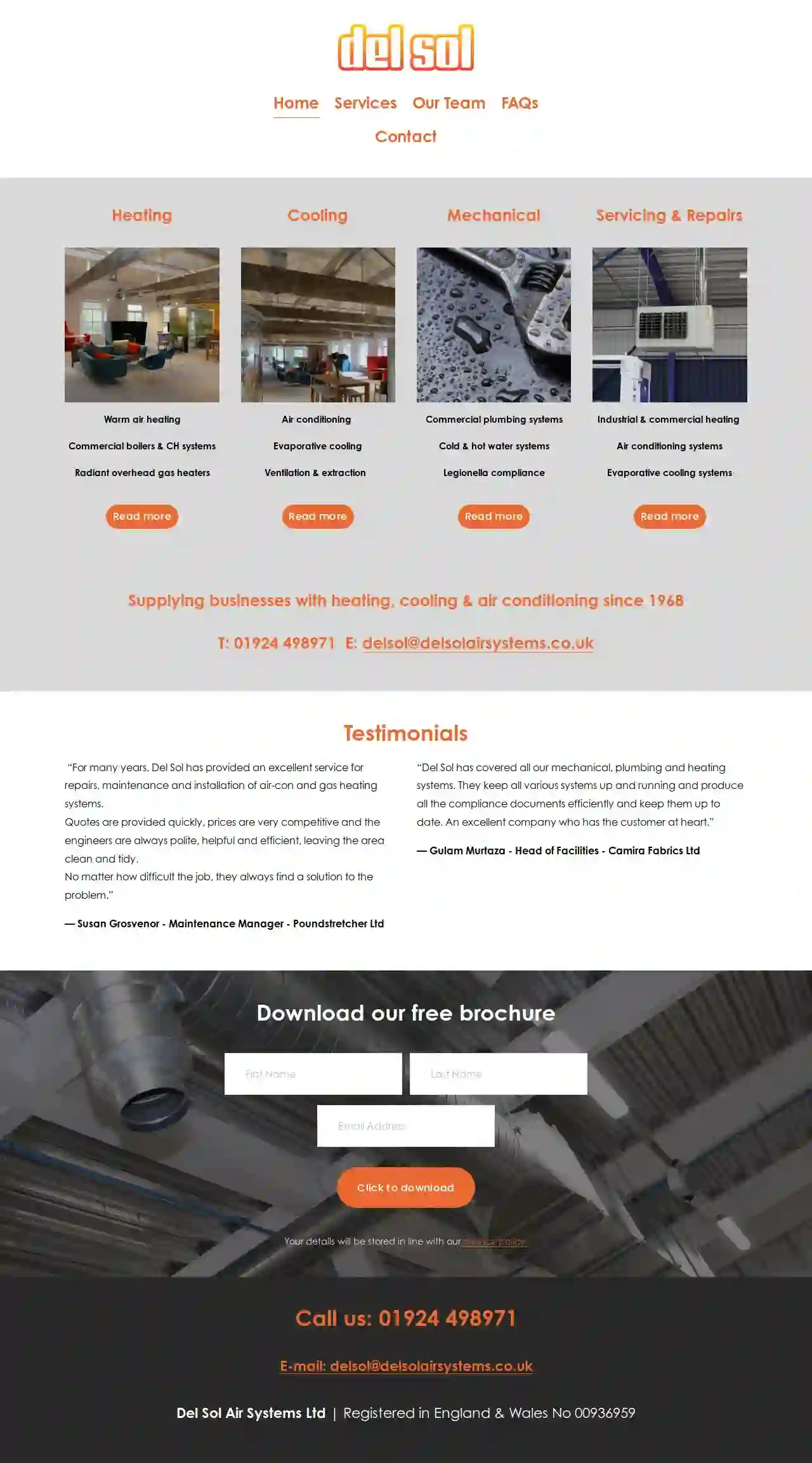
Del Sol Air Systems Ltd
52 reviewsUnit 14, Bankfield Mills, Huddersfield Rd, Mirfield, WF14 9DQ, GBDel Sol Air Systems has been supplying businesses with heating, cooling and air conditioning solutions since 1968. We understand that your premises need to be both warm and energy-efficient. If your colleagues are shivering in one part of the building while overheating in another, and your energy bills are rising, we can help. Our team has the knowledge and experience to understand your heat control issues and put things right. We offer a range of services, including warm air heating, commercial boilers, radiant overhead gas heaters, wet central heating systems, factory workspace heaters, traditional heating systems with radiators, heat recovery, servicing & maintenance, ducting & ventilation.
- Services
- Why Us?
- Accreditations
- Our Team
- Testimonials
- Gallery
Get Quote
Huddersfield Electrical Contractors Ltd
4.73 reviewsAspley Business Park, Lincoln Street, Unit 5, Huddersfield, HD1 6RX, GBHuddersfield Electrical Contractors are Yorkshire’s leading electrical, Air Conditioning, renewable energy and facilities management company. Established for over 15 years, we design, install and maintain electrical systems for commercial, industrial and residential clients. We’re tried, tested and trusted by some of the UK’s leading brands and businesses who rely on us to deliver high-quality electrical services. We’re retail fit-out experts, transforming tired retail spaces into inspiring experiences. At HEC, we offer high-quality services with prices that won’t come as a shock. At HEC, everything we do is to the highest standards. We’re NICEIC approved electrical contractors and hold accreditations from the UK’s leading industry bodies. You can trust us because they do. At HEC, we pride ourselves on our ability to deliver an outstanding service, it’s why so many of our customers keep coming back. We’re proud to say that every job is completed to an exceptional standard at the best possible price. It’s our promise to you.
- Services
- Why Us?
- Gallery
Get Quote
MAP Mechanical
4.77 reviewsThe Dyeworks, Lockwood, Unit H, Huddersfield, HD1 3RE, GBWelcome to MAP Mechanical, a company with over 50+ years of experience offering plumbing, heating, ventilation and air conditioning services covering the whole of the UK. We have evolved from a plumbing and heating company in Huddersfield, West Yorkshire, formerly known as B's Plumbing and Heating. Our team of experts provides a vast range of commercial plumbing and heating services, including boiler installations, servicing and maintenance, gas safety checks, hot and cold water systems, and more. We pride ourselves on building strong relationships with our clients, ensuring that their jobs are completed on time and on budget. Our goal is to provide trustworthy and reliable services, and we strive to maintain the highest standards in our work.
- Services
- Why Us?
- Gallery
Get Quote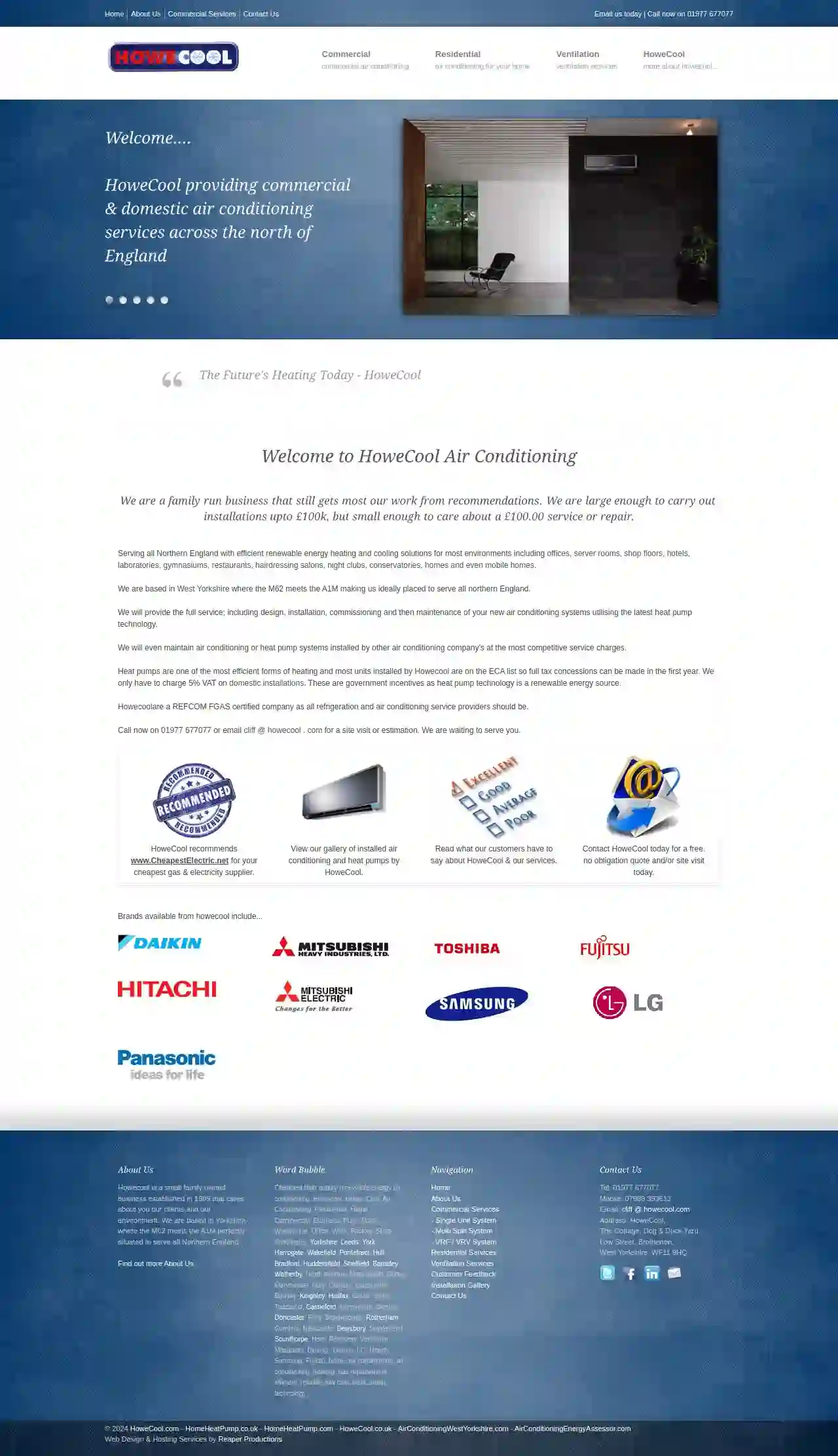
Howecool
51 reviewsThe Cottage, Dog & Duck Yard, Low Street, Brotherton, WF11 9HQ, GBWelcome to HoweCool Air Conditioning, a family run business established in 1999 that cares about you our clients and our environment. We are based in Yorkshire, where the M62 meets the A1M perfectly situated to serve all Northern England. We provide commercial and domestic air conditioning services across the north of England, utilizing the latest heat pump technology. We will provide the full service; including design, installation, commissioning and then maintenance of your new air conditioning systems. We will even maintain air conditioning or heat pump systems installed by other air conditioning company's at the most competitive service charges. Heat pumps are one of the most efficient forms of heating and most units installed by Howecool are on the ECA list so full tax concessions can be made in the first year. We only have to charge 5% VAT on domestic installations. These are government incentives as heat pump technology is a renewable energy source. We are a REFCOM FGAS certified company as all refrigeration and air conditioning service providers should be.
- Services
- Why Us?
- Accreditations
- Our Team
- Gallery
Get Quote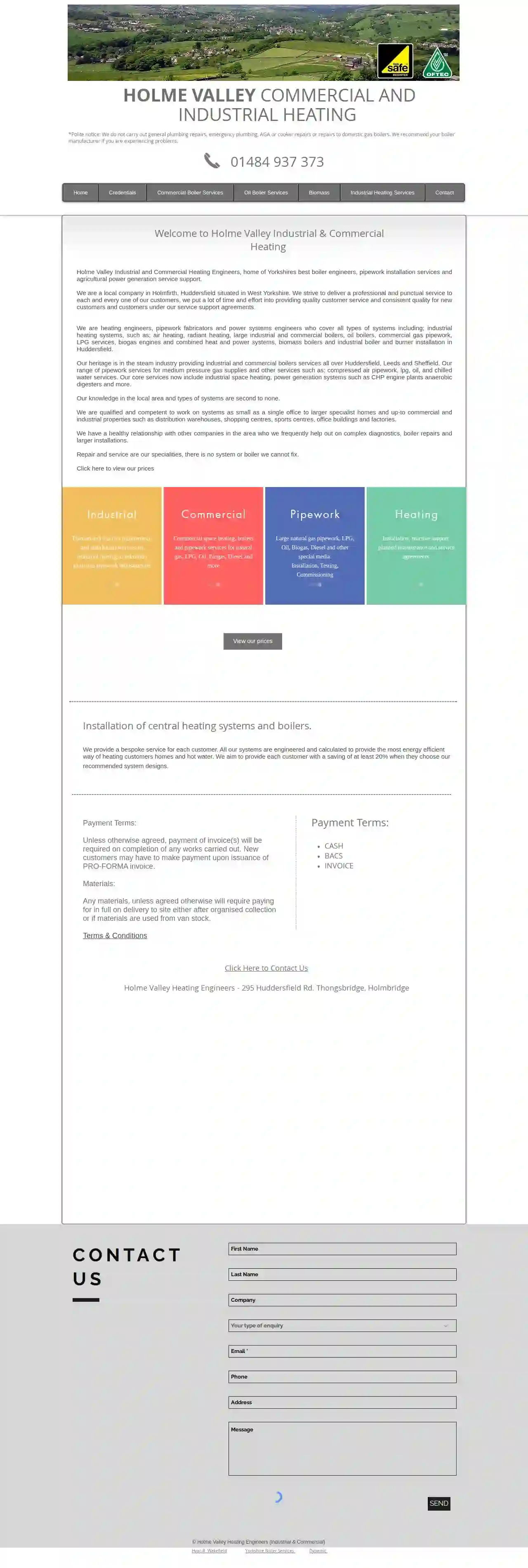
Holme Valley Heating
57 reviewsThongsbridge, Holmbridge, 295 Huddersfield Rd, Holmfirth, HD9 3QF, GBWelcome to Holme Valley Industrial & Commercial Heating, home of Yorkshire's best boiler engineers, pipework installation services and agricultural power generation service support. We are a local company in Holmfirth, Huddersfield situated in West Yorkshire. We strive to deliver a professional and punctual service to each and every one of our customers, we put a lot of time and effort into providing quality customer service and consistent quality for new customers and customers under our service support agreements. We are heating engineers, pipework fabricators and power systems engineers who cover all types of systems including; industrial heating systems, such as; air heating, radiant heating, large industrial and commercial boilers, oil boilers, commercial gas pipework, LPG services, biogas engines and combined heat and power systems, biomass boilers and industrial boiler and burner installation in Huddersfield. Our heritage is in the steam industry providing industrial and commercial boilers services all over Huddersfield, Leeds and Sheffield. Our range of pipework services for medium pressure gas supplies and other services such as; compressed air pipework, LPG, oil, and chilled water services. Our core services now include industrial space heating, power generation systems such as CHP engine plants anaerobic digesters and more. Our knowledge in the local area and types of systems are second to none. We are qualified and competent to work on systems as small as a single office to larger specialist homes and up-to commercial and industrial properties such as distribution warehouses, shopping centres, sports centres, office buildings and factories. We have a healthy relationship with other companies in the area who we frequently help out on complex diagnostics, boiler repairs and larger installations. Repair and service are our specialities, there is no system or boiler we cannot fix.
- Services
- Why Us?
- Gallery
Get Quote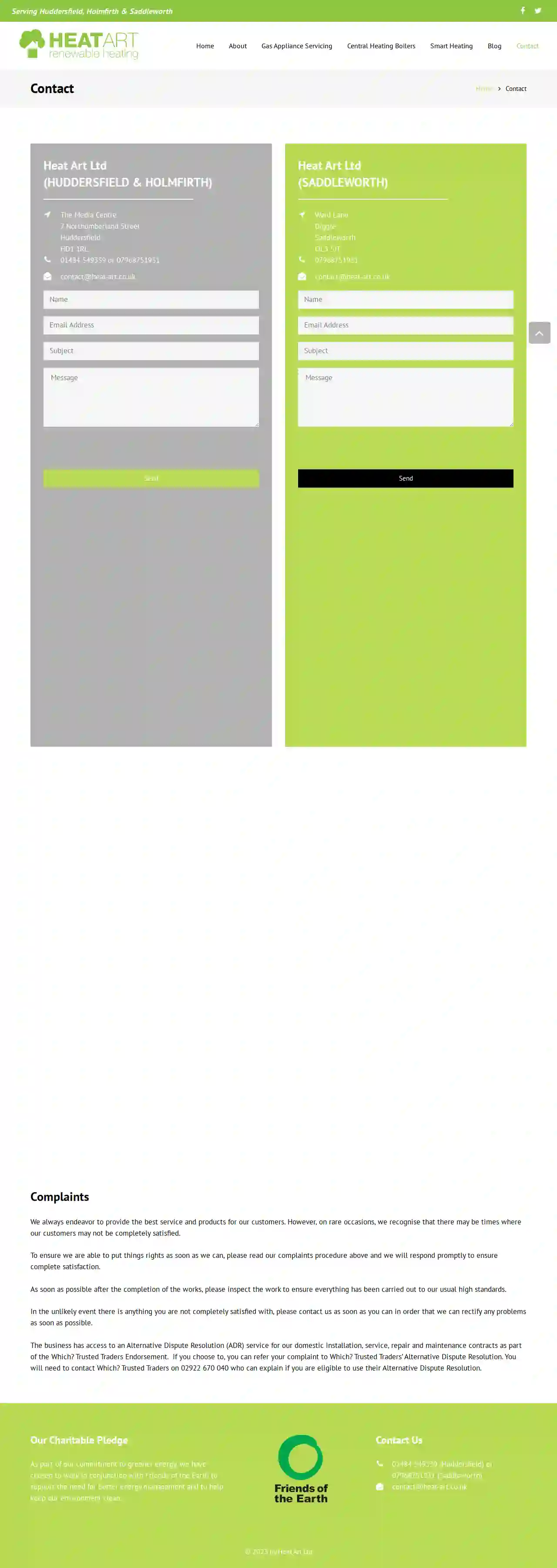
Heat Art Gas Services
511 reviewsThe Media Centre, 7 Northumberland Street, Huddersfield, HD1 1RL, GBHeat Art Ltd has been serving the gas and heating needs of Huddersfield, Holmfirth, and Saddleworth for over 30 years. We are a Worcester Bosch Accredited company, known for our high standards of service and expertise. Our team of highly trained professionals is dedicated to providing fast, reliable, and professional service to all our customers. We take pride in our impressive client portfolio, which includes The Scouts Association and The Church of England. This year, we are thrilled to have been awarded the Which? Certificate of Distinction, a testament to our commitment to excellence. We are also proud members of Which? Trusted Traders, Checkatrade, and Trustpilot, ensuring our customers receive the highest quality workmanship and professionalism. At Heat Art, we are committed to providing energy-efficient and compliant smart homes, utilizing the latest smart home technology. We are Gas Safe Registered and prioritize gas safety, always displaying our official identity card upon request.
- Services
- Why Us?
- Accreditations
- Gallery
Get Quote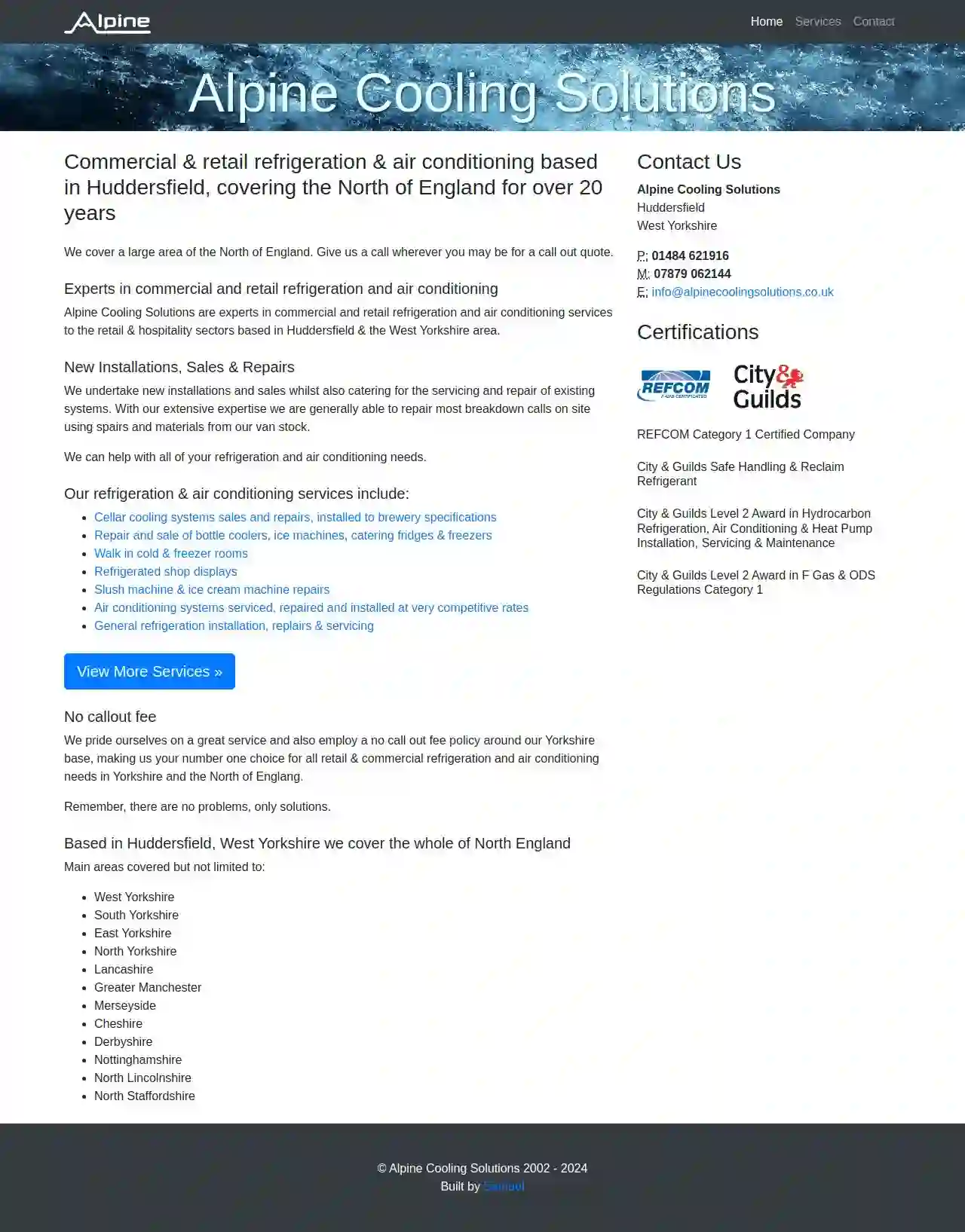
Alpine Cooling Solutions
Alpine Cooling Solutions, Huddersfield, GBAlpine Cooling Solutions is a commercial and retail refrigeration and air conditioning company based in Huddersfield, West Yorkshire. We have been serving the North of England for over 20 years. We cover a large area of the North of England. Give us a call wherever you may be for a call out quote. We undertake new installations and sales whilst also catering for the servicing and repair of existing systems. With our extensive expertise we are generally able to repair most breakdown calls on site using spairs and materials from our van stock. We can help with all of your refrigeration and air conditioning needs.
- Services
- Why Us?
- Accreditations
- Gallery
Get Quote
Huddersfield Insulation
54 reviewsHuddersfield, GBWe are the Premiere Insulation Contractors in Huddersfield, UK. Call Us Today +44 1484 627232 Huddersfield Insulation Huddersfield Insulation Services are here to help you to reduce the heating costs of your property. We attain this by offering several insulation services, which include home insulation, garage door insulation, Rockwool insulation, loft insulation, and conservatory roof insulation.Approximately 30% of heat is given off from your property through the walls. Huddersfield Insulation Professionals is a pro in this particular area as well as understands the best methods to keep these huge quantities of high heat from being lost. We'll carry out a detailed analysis of the house and also suggest one of our effective and efficient insulation services. Huddersfield Insulation Contractors are here to help you to reduce your power bills and also reduce your carbon footprint. Huddersfield Insulation Services Insulation Home Insulation Rockwool Insulation Loft Insulation Conservatory Roof Insulation Garage Door Insulation Insulation Huddersfield Insulation offers providers for insulation services to both commercial and residential properties in Huddersfield, as well as the surrounding region of West Yorkshire places. Huddersfield Insulation supplies commercial insulation for a significant series of markets. Our customers get extraordinary service along with great value for their cash on every project. Huddersfield Insulation is based in Huddersfield and has a highly skilled team of insulation professionals. Our knowledge consists of both attributes along with global tasks. We are going to continue to be aiming to present by far the most helpful top-quality product and insulation services to our customers. Loft insulation is among the most adaptable types of insulation. It has probably the most effective insulation residential properties available in the modern-day industry. It can certainly be weatherproof as well as stabilise frameworks, which lengthens the life span of great older buildings. Look no more in case you are looking for a sturdy, sustainable cure for your insulation issues. Huddersfield Insulation is are specialist for the job. Our experts make use of a mix of polyol material and also isocyanate at the pointer of the guns to create an insulation layer. Expanding foam is used for roofing tiles, concrete pieces, and also cavity walls. Our insulation professionals are one of the most qualified UK Insulation companies. Our insulation expertise is easily provided to businesses, developers, designers, specifiers, and a
- Services
- Why Us?
- Gallery
Get Quote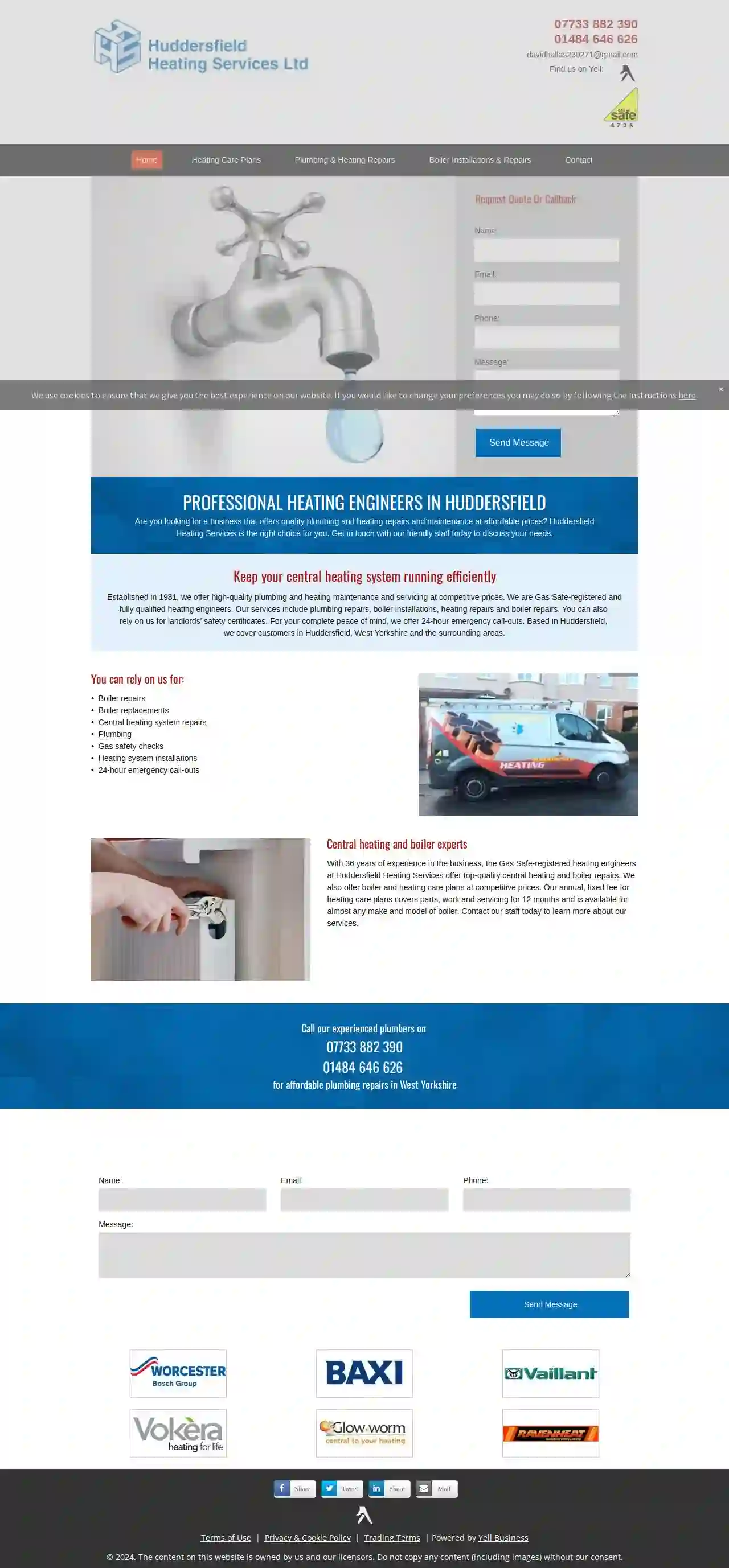
Huddersfield Heating Services
4.47 reviewsAlmondbury, Huddersfield, 7 Far view bank, HD5 8EP, GBHuddersfield Heating Services is a professional heating engineering company based in Huddersfield, West Yorkshire. With 36 years of experience, we offer high-quality plumbing and heating maintenance and servicing at competitive prices. Our services include plumbing repairs, boiler installations, heating repairs, and boiler repairs. We are Gas Safe-registered and fully qualified heating engineers. Our annual, fixed fee for heating care plans covers parts, work, and servicing for 12 months and is available for almost any make and model of boiler. We also offer 24-hour emergency call-outs and landlords' safety certificates. Contact our friendly staff today to learn more about our services.
- Services
- Why Us?
- Accreditations
- Gallery
Get Quote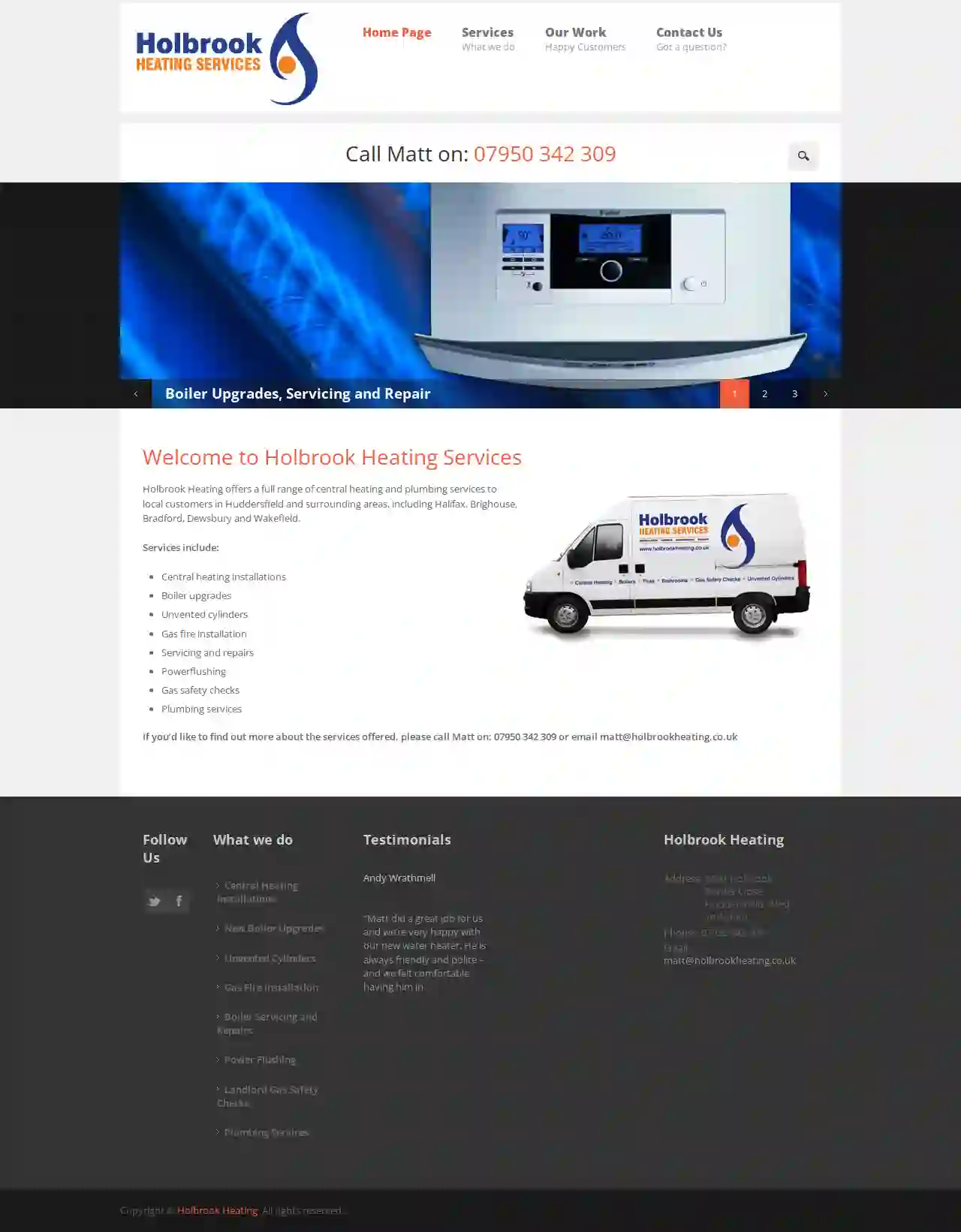
Holbrook Heating Services
44 reviewsBorder Close, Huddersfield, GBHolbrook Heating offers a full range of central heating and plumbing services to local customers in Huddersfield and surrounding areas, including Halifax, Brighouse, Bradford, Dewsbury and Wakefield. Services include: Central heating installations, Boiler upgrades, Unvented cylinders, Gas fire installation, Servicing and repairs, Powerflushing, Gas safety checks and Plumbing services. If you’d like to find out more about the services offered, please call Matt on: 07950 342 309 or email [email protected]
- Services
- Why Us?
- Our Team
- Testimonials
- Gallery
Get Quote
Over 12,692+ HVAC Businesses registered
Our HVAC experts operate in Honley and surroundings!
HVACCompaniesHub has curated and vetted Top HVAC Businesses arround Honley. Find a top & reliable pro today.
Frequently Asked Questions About HVAC Companies
- Frequent Repairs: If your system requires repairs frequently, it may be more cost-effective to replace it.
- Age of System: HVAC systems typically last 15-20 years. If your system is nearing or beyond that age, it's likely less efficient and more prone to breakdowns.
- Increased Energy Bills: A significant rise in energy bills could indicate your system is losing efficiency and needs replacement.
- Uneven Temperatures: If some rooms are too hot or too cold, it could be a sign of ductwork problems or an undersized/aging system.
- Poor Indoor Air Quality: If you're experiencing allergies, dust, or other indoor air quality issues, a new HVAC system with better filtration could help.
- Strange Noises or Smells: Unusual noises or foul odors emanating from your HVAC system could signal the need for a new HVAC system.
- Regular Air Filter Replacement: Change or clean your HVAC system’s air filters regularly (every 1-3 months).
- Professional Air Duct Cleaning: Have your air ducts cleaned by professionals every few years to eliminate dust, mold, and other contaminants.
- Improve Ventilation: Ensure adequate ventilation in your home to bring in fresh air and exhaust stale air. Use exhaust fans in kitchens and bathrooms.
- Control Humidity Levels: Use a humidifier or dehumidifier to maintain optimal humidity levels and prevent mold growth.
- Clean Regularly: Dust and vacuum frequently to minimize airborne particles.
- Avoid Smoking Indoors: Smoking indoors significantly reduces IAQ.
- Use Natural Cleaning Products: Opt for natural cleaning products that don’t release harmful VOCs (volatile organic compounds).
- Monitor Indoor Air Quality: Consider using an indoor air quality monitor to track pollutant levels.
- Warm Air: The most noticeable sign is that the AC is blowing warm or not cool air.
- Ice Buildup: Ice may form on the AC unit.
- Increased Energy Bills: Your system has to work harder to cool, leading to higher energy consumption.
- Hissing or Bubbling Sounds: These sounds can indicate a refrigerant leak.
- Experience: Choose a contractor with extensive experience in the HVAC industry, especially in the type of service you need.
- Licensing and Insurance: Verify that the contractor is properly licensed and insured.
- Certifications: Look for NATE (North American Technician Excellence) certification, which indicates a high level of technical competency.
- Reputation: Check online reviews and ratings to assess the contractor's reputation and customer satisfaction levels.
- References: Ask for references from past customers and contact them to inquire about their experience.
- Estimates and Quotes: Get written estimates or quotes from multiple contractors to compare pricing and services.
- Warranty Information: Ask about warranties on equipment and labor.
- Communication: Effective communication is key. Choose a contractor who responds promptly and clearly answers your questions.
What are the signs that I need a new HVAC system?
How can I improve my home's indoor air quality?
What are the signs my air conditioner needs refrigerant?
How do I choose the right HVAC contractor?
What are the signs that I need a new HVAC system?
- Frequent Repairs: If your system requires repairs frequently, it may be more cost-effective to replace it.
- Age of System: HVAC systems typically last 15-20 years. If your system is nearing or beyond that age, it's likely less efficient and more prone to breakdowns.
- Increased Energy Bills: A significant rise in energy bills could indicate your system is losing efficiency and needs replacement.
- Uneven Temperatures: If some rooms are too hot or too cold, it could be a sign of an inefficient HVAC system.
- Poor Indoor Air Quality: If you're experiencing allergies, dust, or other indoor air quality issues, a new HVAC system with better filtration could help.
- Strange Noises or Smells: Unusual noises or foul odors emanating from your HVAC system could signal a problem that requires a system replacement.
How can I improve my home's indoor air quality?
- Regular Air Filter Replacement: Change or clean your HVAC system’s air filters regularly (every 1-3 months).
- Professional Air Duct Cleaning: Have your air ducts cleaned by professionals every few years to eliminate dust, mold, and other contaminants.
- Improve Ventilation: Ensure adequate ventilation in your home to bring in fresh air and exhaust stale air. Use exhaust fans in kitchens and bathrooms.
- Control Humidity Levels: Use a humidifier or dehumidifier to maintain optimal humidity levels and prevent mold growth.
- Clean Regularly: Dust and vacuum frequently to minimize airborne particles.
- Avoid Smoking Indoors: Smoking indoors significantly reduces IAQ.
- Use Natural Cleaning Products: Opt for natural cleaning products that don’t release harmful VOCs (volatile organic compounds).
- Monitor Indoor Air Quality: Consider using an indoor air quality monitor to track pollutant levels.
What are the signs my air conditioner needs refrigerant?
- Warm Air: The most noticeable sign is that the AC is blowing warm or lukewarm air.
- Ice Buildup: Ice may form on the refrigerant lines or evaporator coil.
- Increased Energy Bills: Your system has to work harder to cool, leading to higher energy consumption.
- Hissing or Bubbling Sounds: These sounds can indicate a refrigerant leak.
How do I choose the right HVAC contractor?
- Experience: Choose a contractor with extensive experience in the HVAC industry, especially in the type of service you need.
- Licensing and Insurance: Verify that the contractor is properly licensed and insured.
- Certifications: Look for NATE (North American Technician Excellence) certification, which indicates a high level of technical competency.
- Reputation: Check online reviews and ratings to assess the contractor's reputation and customer satisfaction levels.
- References: Ask for references from past customers and contact them to inquire about their experience.
- Estimates and Quotes: Get written estimates or quotes from multiple contractors to compare pricing and services.
- Warranty Information: Ask about warranties on equipment and labor.
- Communication: Effective communication is key. Choose a contractor who responds promptly and clearly answers your questions.